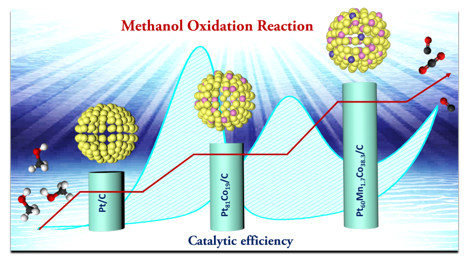An alloy of Cobalt and Platinum when doped with Manganese has been found to be an effective catalyst for methanol oxidation reaction (MOR) that takes place at the anode of the direct methanol fuel cells (DMFCs) which is an attractive alternate power source for a large number of energy applications.
Among the different classes of fuel cells proposed, DMFCs have long been considered an attractive alternate power source for small vehicles such as forklifts and as battery chargers for mobile phones, digital cameras, laptops, and other small electronic gadgets, due to their high energy density, high efficiency, and low operating temperature. DMFCs are also much safer to operate because they deal with liquid fuel (methanol). The methanol oxidation reaction (MOR) at the anode and oxygen reduction reaction (ORR) at the cathode are the main processes that determine the performance of DMFCs. Pt is the most often used MOR catalyst. However, fundamental challenges such as slow kinetics, high manufacturing costs (due mostly to the pricey Pt-based catalyst), and CO poisoning of the Pt catalyst make commercialization of DMFCs challenging. Therefore, the search for an alternative Pt-based catalyst that circumvents the above issues is one of the most pressing research problems with respect to DMFCs. Alloying Pt with other transition metals such as (Ru, Co, Ni, and Fe) is thought to be a useful strategy for improving the catalytic performance and durability of Pt catalyst along with reducing the amount of Pt being used in the catalyst.
In this direction, researchers from the National Chemical Laboratory (CSIR-NCL), Pune, and Centre for Nano and Soft Matter Sciences (CeNS), Bangalore, an autonomous institute of the Department of Science and Technology (DST) have synthesized a trimetallic PtMnCo catalyst that displayed superior catalytic activity and high CO tolerance when compared to commercially available catalyst. The choice of Mn as a dopant was based on its abundance and affordability and the multiple oxidation states it offers making it a good candidate for electro-catalysis.
In the work published in ACS Applied Materials and Interfaces recently the NCL-CeNS researchers have prepared a series of trimetallic Pt100-x(MnCo)x catalysts. The results of this study supported by the Science and Engineering Research Board (SERB), an attached institution of the DST and involving a DST Inspire fellow indicated that incorporation of a small amount of Mn in bimetallic alloy (PtCo) leads to enhancement in the performance towards MOR. Among all the compositions studied, the Pt60Mn1.7Co38.3/C catalyst exhibited 1.9 times higher mass activity than that of the commercial Pt/Ccatalyst. This alloy catalyst also showed better tolerance toward CO poisoning. This improved performance and CO tolerance has been attributed to the synergistic effect of Co and Mn on the Pt lattice.

Publication details: DOI: https://doi.org/10.1021/acsami.3c01140
For further details, Prof. B L V Prasad (Email: pl.bhagavatula[at]cens[dot]res[dot]in) can be contacted.






























